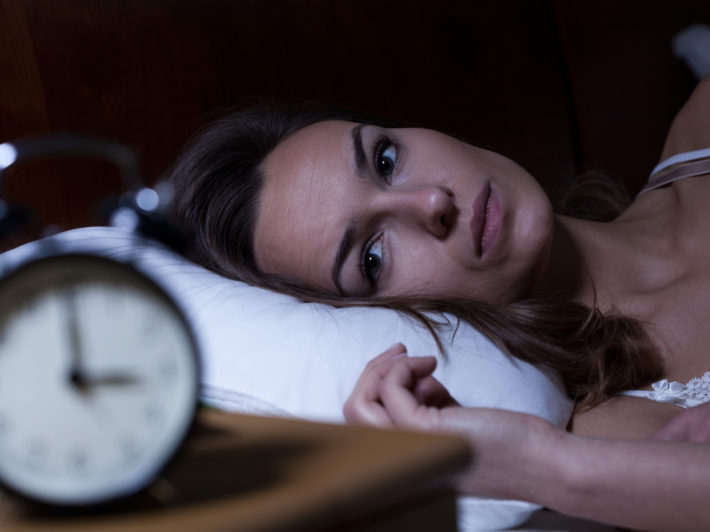|
Exploring key factors associated with sleep disturbances during perimenopause by Bianca Garilli, ND
The demarcations of a woman’s physiological stages of life are often delineated by the various, unique phases and cycles associated with fertility, reproduction, and the hormones at work behind the scenes. These stages include:1
For many women, after many years of sleep deprivation during the child-bearing and rearing years, a good night’s rest is welcomed. Unfortunately, perimenopause, which typically begins sometime in a woman’s mid-to-late 40s and can last anywhere from 2-10 years, may create a whole new set of sleep challenges.2,3 Prevalence of sleep problems during perimenopause Compared to men, sleep complaints are approximately twice as prevalent in women of all ages, with a prevalence during perimenopause ranging from 39-47%, underscoring the importance of investigating sleep problems in a female-centric way.3 To this end, sleep duration and quality of a nationally representative sample of women 40-59 years of age were studied by the CDC and broken down categorically by menstrual cycle/menopausal phase; sleep data during the perimenopausal phase revealed that:4
Hormones are at play Sex hormones So what is happening during perimenopause that so dramatically and negatively impacts sleep patterns? For starters, the decline in levels of sex hormones (in particular estrogen, progesterone, and testosterone) during the perimenopausal years lead to an array of symptoms, most of which can adversely affect sleep habits. These include: hot flashes, migraines, sleep apnea, circadian rhythm abnormalities, restless legs syndrome, lifestyle factors, as well as mood disturbances such as anxiety.2,4,5 Interestingly, in an analysis reviewing sleep concerns in various stages of menses/menopause, it was found that vasomotor symptoms (hot flashes) and sleep disturbances may work bidirectionally.6 In other words, hot flashes may increase difficulties obtaining appropriate duration and quality of sleep, while sleep problems may worsen vasomotor symptoms,6 a circuitous “what came first?- chicken or egg,” kind of hormonal dance. The types of sleep disturbances most often noted by perimenopausal women include difficulties with initiating and/or maintaining sleep, as well as frequent nocturnal and/or early morning awakenings.5 It’s well known that during perimenopause, estrogen levels drop sharply, corresponding to many of the symptoms associated with this transition period. However, less well known is another hormone whose levels decline and no doubt, play a key role in sleep dysfunction. That hormone is melatonin, which decreases during perimenopause, although the decline in melatonin is more gradual than that of estrogen.7 Melatonin Melatonin secretion from the pineal gland drops as individuals hit their mid-life years, coinciding with the perimenopausal phase in women.7 An article published in the Journal of Sleep Disorders and Therapy indicates that exogenous use of melatonin may improve some of these sleep challenges, including the nocturnal awakenings observed during perimenopause.5 Further research indicates that the use of slow-release melatonin preparations increase total sleep time and sleep efficiency, as well as reducing sleep latency in patients with insomnia.5 Interestingly, melatonin may also play a role in the modulation of many symptoms and conditions associated with menopause, including reduction in bone density, mood disorders, fibromyalgia, and potentially even neurodegenerative diseases.7 Assuredly, much more research is needed in the area of sleep disorders, perimenopause, and related hormonal fluctuations. Sociodemographic factors Sociodemographic variables can also contribute to perimenopausal sleep disturbances:
Women who are experiencing sleep concerns should work with a healthcare practitioner trained to 1) take a deep dive into the various aspects of lifestyle that may be affecting sleep health and 2) identify and address any deleterious health consequences from inadequate sleep. These areas should encompass the full spectrum of her individual health and wellness, from a focused cardiovascular and metabolic exam, to an in-depth look into the social and emotional aspects of her life. Each of these areas is important to consider and address to effectively and safely treat sleep challenges during the perimenopausal years and beyond. Citations
0 Comments
Leave a Reply. |
Categories
All
Archives
April 2024
|
|
Join Our Community
|
|
Amipro Disclaimer:
Certain persons, considered experts, may disagree with one or more of the foregoing statements, but the same are deemed, nevertheless, to be based on sound and reliable authority. No such statements shall be construed as a claim or representation as to Metagenics products, that they are offered for the diagnosis, cure, mitigation, treatment or prevention of any disease. |



 RSS Feed
RSS Feed